| Listing 1 - 10 of 21 | << page >> |
Sort by
|
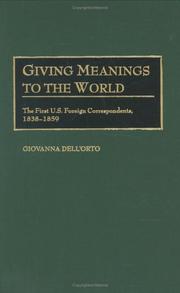
ISBN: 0313012776 9780313012778 0313322902 9780313322907 1280468815 9781280468810 9786610468812 6610468818 9798400657252 Year: 2002 Publisher: Westport, Conn. : London : Praeger, Bloomsbury Publishing,
Abstract | Keywords | Export | Availability | Bookmark
 Loading...
Loading...Choose an application
- Reference Manager
- EndNote
- RefWorks (Direct export to RefWorks)
Foreign news --- Foreign correspondents --- Flow of news, International --- International flow of news --- International news --- News, Foreign --- News flow, International --- World news --- Journalism --- News agencies --- Press --- History
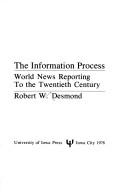
ISBN: 1587290456 9781587290459 0877450706 9780877450702 Year: 1978 Publisher: Iowa City : University of Iowa Press,
Abstract | Keywords | Export | Availability | Bookmark
 Loading...
Loading...Choose an application
- Reference Manager
- EndNote
- RefWorks (Direct export to RefWorks)
Newspapers --- News agencies --- Foreign news --- Journalism --- Journalism & Communications --- Flow of news, International --- International flow of news --- International news --- News, Foreign --- News flow, International --- World news --- Press --- News-gathering organizations --- News services --- News wire services --- Wire services --- History. --- History
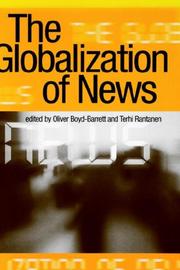
ISBN: 1446250261 1446238024 1282622978 9786612622977 0857026151 9780857026156 9781446250266 0761953868 9780761953869 0761953876 9780761953876 9781446238028 9781282622975 Year: 1998 Publisher: London : SAGE,
Abstract | Keywords | Export | Availability | Bookmark
 Loading...
Loading...Choose an application
- Reference Manager
- EndNote
- RefWorks (Direct export to RefWorks)
'The Globalization of News' aims to demonstrate just how the news agencies have contributed to the process of globalisation and simultaneously, to the process of national construction.
News agencies. --- Foreign news. --- Flow of news, International --- International flow of news --- International news --- News, Foreign --- News flow, International --- World news --- Journalism --- News agencies --- Press --- News-gathering organizations --- News services --- News wire services --- Wire services --- Newspapers --- Foreign news --- #SBIB:309H19 --- #SBIB:AANKOOP --- Nieuwsagentschappen --- Influence.
Book
ISBN: 1443869104 9781443869102 9781443862110 1443862118 1322216061 Year: 2014 Publisher: Newcastle upon Tyne, England : Cambridge Scholars Publishing,
Abstract | Keywords | Export | Availability | Bookmark
 Loading...
Loading...Choose an application
- Reference Manager
- EndNote
- RefWorks (Direct export to RefWorks)
Though writers and readers have long agreed that travel does not only broaden the mind, but that it is also useful to report on such an experience, the question of what to report on and how has remained a matter of debate. To think of travel and travel writing as ""foreign correspondence"" is to apply, metaphorically, a phrase that has its own complex and overlapping history in journalism, politics, and international culture. The chapters of this volume focus on this notion, seen here as a dual...
Communication, International. --- Foreign news --- Journalism --- Reporters and reporting. --- Newspaper reporting --- Newspapers --- Writing (Authorship) --- Literature --- Publicity --- Fake news --- Flow of news, International --- International flow of news --- International news --- News, Foreign --- News flow, International --- World news --- News agencies --- Press --- International communication --- World communication --- Communication --- Political aspects. --- International cooperation.
Book
ISBN: 0231545754 9780231545754 9780231184922 9780231184939 0231184921 9780231184922 023118493X 9780231184939 Year: 2018 Publisher: New York, NY : Columbia University Press,
Abstract | Keywords | Export | Availability | Bookmark
 Loading...
Loading...Choose an application
- Reference Manager
- EndNote
- RefWorks (Direct export to RefWorks)
As traditional news outlets’ international coverage has waned, several prominent nongovernmental organizations have taken on a growing number of seemingly journalistic functions. Groups such as Amnesty International, Human Rights Watch, and Médecins Sans Frontières send reporters to gather information and provide analysis and assign photographers and videographers to boost the visibility of their work. Digital technologies and social media have increased the potential for NGOs to communicate directly with the public, bypassing traditional gatekeepers. But have these efforts changed and expanded traditional news practices and coverage—and are there consequences to blurring the lines between reporting and advocacy?In NGOs as Newsmakers, Matthew Powers analyzes the growing role NGOs play in shaping—and sometimes directly producing—international news. Drawing on interviews, observations, and content analysis, he charts the dramatic growth in NGO news-making efforts, examines whether these efforts increase the organizations' chances of garnering news coverage, and analyzes the effects of digital technologies on publicity strategies. Although the contemporary media environment offers NGOs greater opportunities to shape the news, Powers finds, it also subjects them to news-media norms. While advocacy groups can and do provide coverage of otherwise ignored places and topics, they are still dependent on traditional media and political elites and influenced by the expectations of donors, officials, journalists, and NGOs themselves. Through an unprecedented glimpse into NGOs’ newsmaking efforts, Powers portrays the possibilities and limits of NGOs as newsmakers amid the transformations of international news, with important implications for the intersections of journalism and advocacy.
Foreign news. --- Reporters and reporting. --- Non-governmental organizations --- INGOs (International agencies) --- International non-governmental organizations --- NGOs (International agencies) --- Nongovernmental organizations --- Organizations, Non-governmental (International agencies) --- Private and voluntary organizations (International agencies) --- PVOs (International agencies) --- International agencies --- Nonprofit organizations --- Newspaper reporting --- Journalism --- Newspapers --- Flow of news, International --- International flow of news --- International news --- News, Foreign --- News flow, International --- World news --- News agencies --- Press --- Influence.
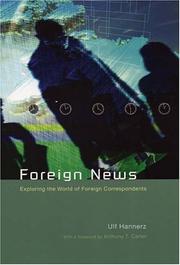
ISBN: 0226315746 0226315754 9786613530424 0226922537 1280126566 9780226315744 9780226315751 9780226922539 9781280126567 Year: 2004 Publisher: Chicago : University of Chicago Press,
Abstract | Keywords | Export | Availability | Bookmark
 Loading...
Loading...Choose an application
- Reference Manager
- EndNote
- RefWorks (Direct export to RefWorks)
Foreign News gives us a fascinating, behind-the-scenes look into the practices of the global tribe we call foreign correspondents. Exploring how they work, Ulf Hannerz also compares the ways correspondents and anthropologists report from one part of the world to another. Hannerz draws on extensive interviews with correspondents in cities as diverse as Jerusalem, Tokyo, and Johannesburg. He shows not only how different story lines evolve in different correspondent beats, but also how the correspondents' home country and personal interests influence the stories they write. Reporting can go well beyond coverage of a specific event, using the news instead to reveal deeper insights into a country or a people to link them to long-term trends or structures of global significance. Ultimately, Hannerz argues that both anthropologists and foreign correspondents can learn from each other in their efforts to educate a public about events and peoples far beyond our homelands. The result of nearly a decade's worth of work, Foreign News is a provocative study that will appeal to both general readers and those concerned with globalization.
Journalism --- Foreign news --- Foreign news. --- Flow of news, International --- International flow of news --- International news --- News, Foreign --- News flow, International --- World news --- News agencies --- Press --- Journalism. --- Writing (Authorship) --- Literature --- Publicity --- Fake news --- foreign correspondents, journalism, reporters, anthropologists, jerusalem, tokyo, johannesburg, outreach, reporting, globalization, media, news, career, region, stories, international relations, middle east, africa, cape town, stockholm, associated press, technology, consumption, information, dissemination, culture, newspaper, newsmagazines, radio, networks, cable, new york times, washington post, guardian, telegraph, bias, fieldwork, audience, mediation, nonfiction, history, politics.
Book
ISBN: 0833083244 0833076949 9780833083241 9780833076946 Year: 2013 Publisher: [Place of publication not identified] Rand
Abstract | Keywords | Export | Availability | Bookmark
 Loading...
Loading...Choose an application
- Reference Manager
- EndNote
- RefWorks (Direct export to RefWorks)
Space debris --- Communication --- Mechanical Engineering --- Engineering & Applied Sciences --- Aeronautics Engineering & Astronautics --- International cooperation --- Communication, International --- Flow of news, International --- International flow of news --- Mass media --- New international communication order --- New international information order --- New world communication order --- New world information order --- News flow, International --- Debris, Space --- Junk in space --- Orbital debris --- Space junk --- Space environment --- Space pollution --- United States. --- U.S. Strategic Command --- USSTRATCOM --- STRATCOM
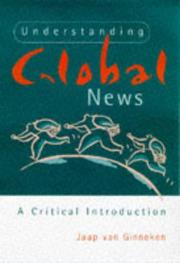
ISBN: 076195709X 0761957081 1283880512 1446217957 1446266176 9780761957096 9781446266175 9781446217955 9781283880510 Year: 1998 Publisher: London ; Thousand Oaks : Sage,
Abstract | Keywords | Export | Availability | Bookmark
 Loading...
Loading...Choose an application
- Reference Manager
- EndNote
- RefWorks (Direct export to RefWorks)
Using the enormous number of available examples and a range of theoretical perspectives, the author demonstrates the ways in which the news media are able to manipulate an individual's perception of the world.
Foreign news. --- Mass media. --- nieuwsberichtgeving --- journalistiek --- #SBIB:309H1025 --- #SBIB:309H1015 --- #SBIB:309H1010 --- Mediaboodschappen met een informatieve functie --- Media: politieke, juridische, ethische, ideologische aspecten (incl. privacy) --- Organisatorische aspecten van de media: algemene werken (incl. journalistiek) --- Foreign news --- Mass media --- #SBIB:AANKOOP --- Mass communication --- Media, Mass --- Media, The --- Communication --- Flow of news, International --- International flow of news --- International news --- News, Foreign --- News flow, International --- World news --- Journalism --- News agencies --- Press --- Mass communications --- Press. --- Media, News --- News media --- Publicity --- Newspapers --- Periodicals
Book
ISBN: 9781107657830 9781107033641 9781139522489 9781107731974 1107731976 1139522485 1107033640 9781107723856 110772385X 1107657830 131609071X 1107720729 1107727863 1107730228 1107728460 Year: 2014 Publisher: Cambridge : Cambridge University Press,
Abstract | Keywords | Export | Availability | Bookmark
 Loading...
Loading...Choose an application
- Reference Manager
- EndNote
- RefWorks (Direct export to RefWorks)
Based on newly available and extensive archival evidence, this book traces the history of international news agencies and associations around the world from 1848 to 1947. Jonathan Silberstein-Loeb argues that newspaper publishers formed news associations and patronized news agencies to cut the costs of news collection and exclude competitors from gaining access to the news. In this way, cooperation facilitated the distribution of news. The extent to which state regulation permitted cooperation, or prohibited exclusivity, determined the benefit newspaper publishers derived from these organizations. This book revises our understanding of the operation and organization of the Associated Press, the BBC, the Press Association, Reuters, and the United Press. It also sheds light on the history of competition policy respecting the press, intellectual property, and the regulation of telecommunications.
Agences de presse --- Presse --- News agencies --- Foreign news --- Press law --- Histoire --- Droit --- History. --- Associated press --- Reuters --- Associated Press --- Press Association (Great Britain) --- Reuters Limited --- Histoire. --- Flow of news, International --- International flow of news --- International news --- News, Foreign --- News flow, International --- World news --- Journalism --- Press --- News-gathering organizations --- News services --- News wire services --- Wire services --- Newspapers --- History --- Reuters ltd. --- Reuter's Agency --- Reuters News Agency --- PA (Great Britain) --- AP --- A.P. --- New England Associated Press
Book
ISBN: 9781421444499 1421444496 9781421444505 142144450X Year: 2022 Publisher: Baltimore, Maryland : Johns Hopkins University Press,
Abstract | Keywords | Export | Availability | Bookmark
 Loading...
Loading...Choose an application
- Reference Manager
- EndNote
- RefWorks (Direct export to RefWorks)
"Fake news" is not new. Just like millions of Americans today, the revolutionaries of the eighteenth century worried that they were entering a "post-truth" era. Their fears, however, were not fixated on social media or clickbait, but rather on peoples' increasing reliance on reading news gathered from foreign newspapers. In Misinformation Nation, Jordan E. Taylor reveals how foreign news defined the boundaries of American politics and ultimately drove colonists to revolt against Britain and create a new nation. News was the lifeblood of early American politics, but newspaper printers had few reliable sources to report on events from abroad. Accounts of battles and beheadings, as well as declarations and constitutions, often arrived alongside contradictory intelligence. Though frequently false, the information that Americans encountered in newspapers, letters, and conversations framed their sense of reality, leading them to respond with protests, boycotts, violence, and the creation of new political institutions. Fearing that their enemies were spreading fake news, American colonists fought for control of the news media. As their basic perceptions of reality diverged, Loyalists separated from Patriots and, in the new nation created by the revolution, Republicans inhabited a political reality quite distinct from that of their Federalist rivals."--
Press and politics --- Foreign news --- American newspapers --- Disinformation --- History --- America --- Americas --- New World --- Western Hemisphere --- Press coverage --- Foreign public opinion. --- Politics and government. --- Politics --- Deception --- Intelligence service --- Online manipulation --- Newspapers --- Journalism --- News agencies --- Press --- Flow of news, International --- International flow of news --- International news --- News, Foreign --- News flow, International --- World news --- Advertising, Political --- Government and the press --- Politics and the press --- Political aspects --- History of North America --- anno 1700-1799 --- United States --- United States of America
| Listing 1 - 10 of 21 | << page >> |
Sort by
|

 Search
Search Feedback
Feedback About UniCat
About UniCat  Help
Help News
News